广东省深圳市Module 3 Unit 5 Educational exchanges Grammar 课件
文档属性
| 名称 | 广东省深圳市Module 3 Unit 5 Educational exchanges Grammar 课件 |  | |
| 格式 | zip | ||
| 文件大小 | 293.5KB | ||
| 资源类型 | 教案 | ||
| 版本资源 | 牛津深圳版 | ||
| 科目 | 英语 | ||
| 更新时间 | 2016-12-13 00:00:00 | ||
图片预览

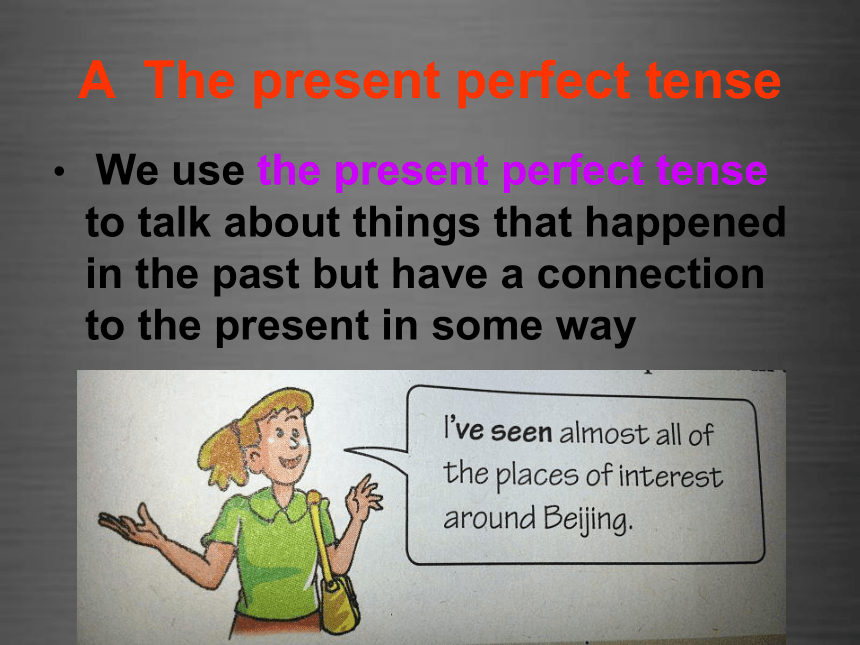
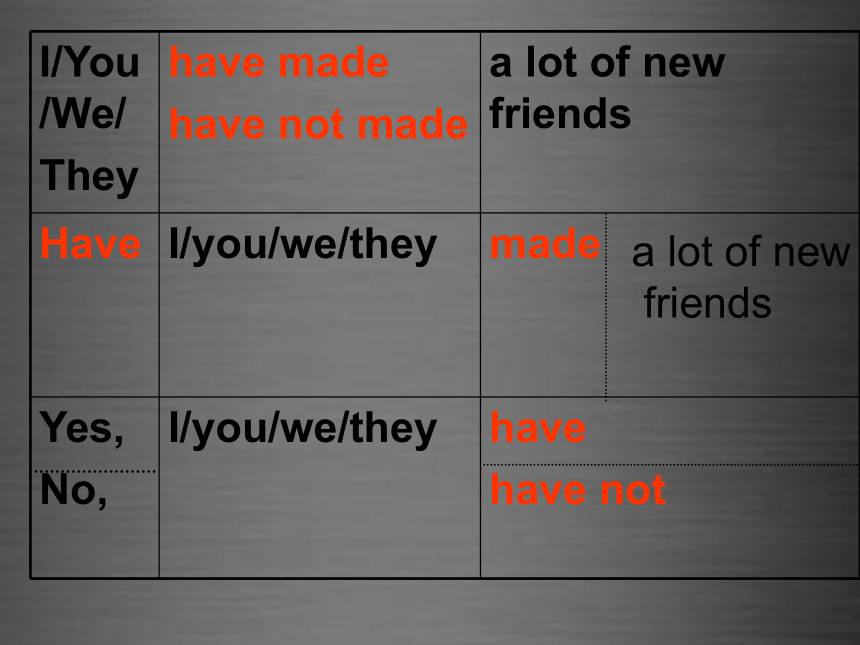
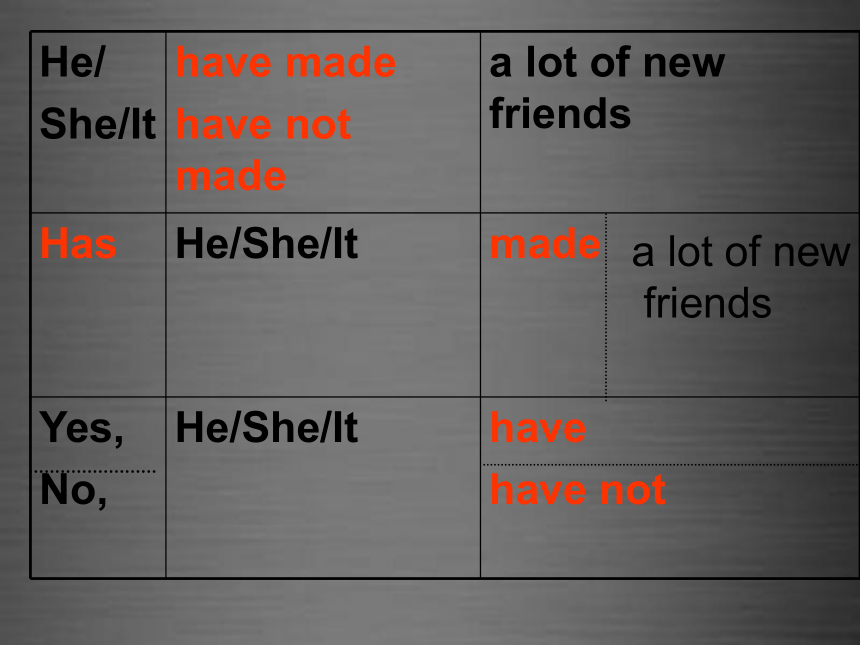
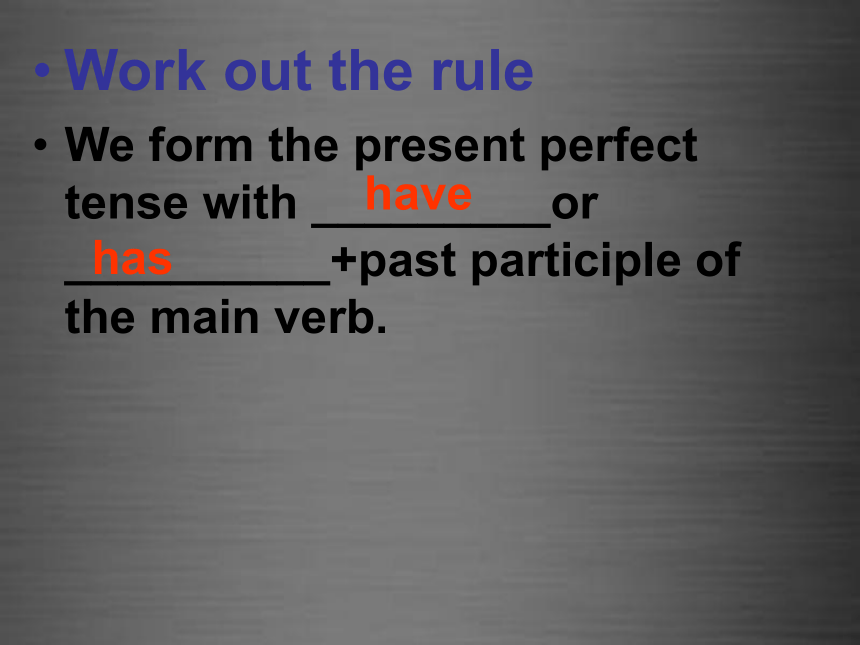
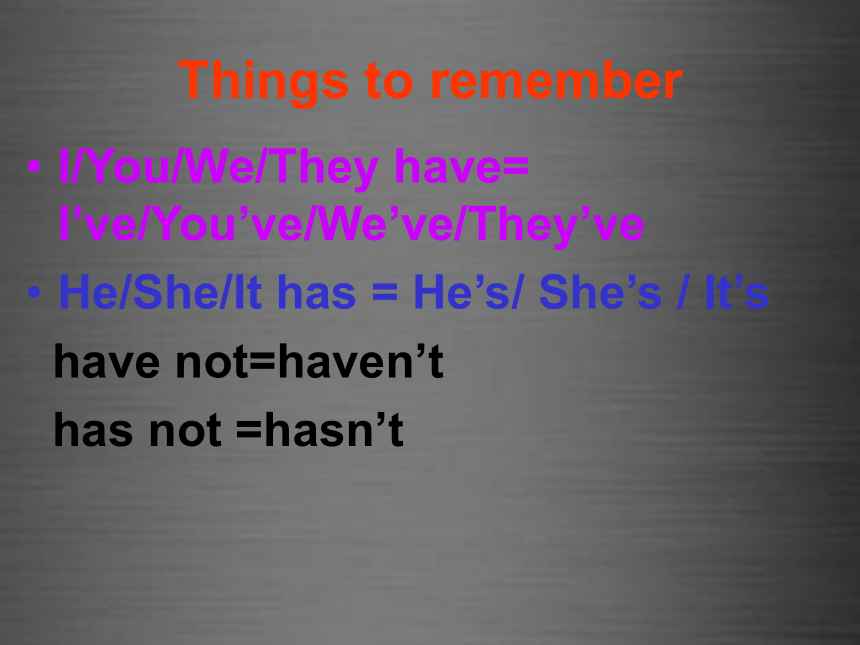
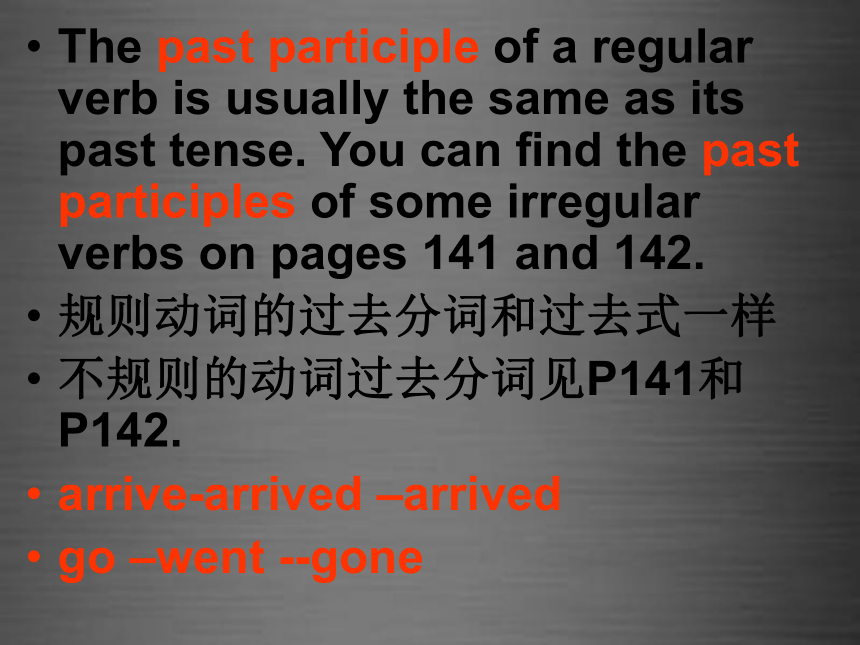
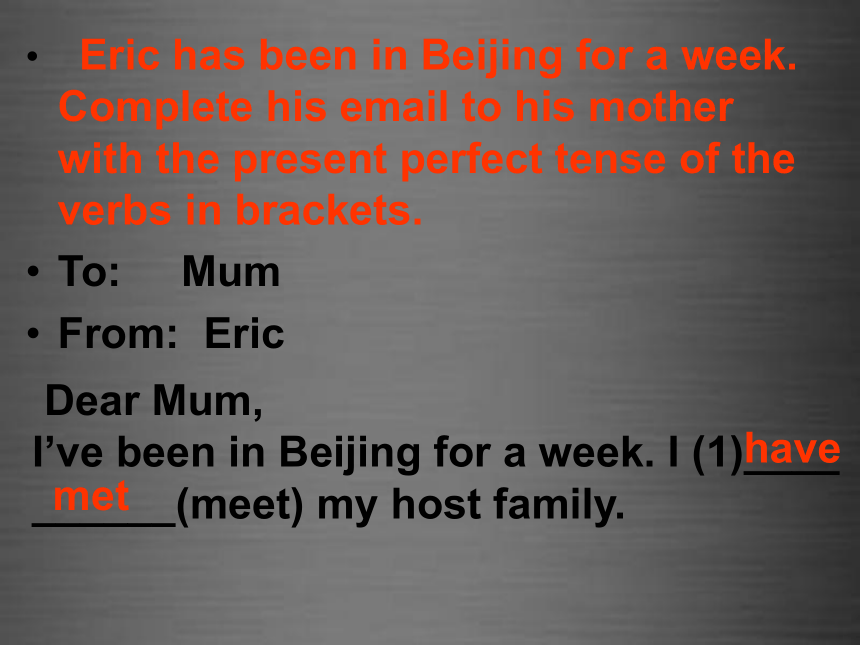

文档简介
课件26张PPT。 Unit5
Educational
exchangesGrammarA The present perfect tense We use the present perfect tense to talk about things that happened in the past but have a connection to the present in some waya lot of new
friendsa lot of new
friendsWork out the rule
We form the present perfect tense with _________or __________+past participle of the main verb.havehasThings to rememberI/You/We/They have= I’ve/You’ve/We’ve/They’ve
He/She/It has = He’s/ She’s / It’s
have not=haven’t
has not =hasn’tThe past participle of a regular verb is usually the same as its past tense. You can find the past participles of some irregular verbs on pages 141 and 142.
规则动词的过去分词和过去式一样
不规则的动词过去分词见P141和P142.
arrive-arrived –arrived
go –went --gone
Eric has been in Beijing for a week. Complete his email to his mother with the present perfect tense of the verbs in brackets.
To: Mum
From: Eric Dear Mum,
I’ve been in Beijing for a week. I (1)____
______(meet) my host family.havemet
They’re really friendly. My host brother Wei and I (2)_____________(play) a lot of football at a park near his home. We both enjoy football very much. Mrs. Li, my host mother, (3)____________(cook) me delicious Chinese food.
have played has cookedI (4)______________(study) Chinese with my British classmates. We (5) ____________(see) some places of interest in Beijing too. However, I (6)_______________(not, visit) the Great Wall yet, and I (7)_____________
(not, do )any shopping either. I will do these things next week.
Love,
Erichave studiedhave seenhaven’t visitedhaven’t doneB The present perfect tense with already, yet, ever and never
We can use already , yet, ever and never with the present perfect tense.Sarah has already seen many places of interest in Beijing.
Have you seen the Great Wall yet?
No, I have not seen the Great Wall yet.
Have you ever visited the Summer Palace?
No, I have never visited the Summer Palace.
Work out the rule
We can use the adverbs already, ever and never(before/after)have /has and (before /after) the main verb.
We often use yet at the (beginning /end)of a question or a negative sentence.
我们可以把already , ever and never 放在have,has 或者实义动词前或者后面。
把 yet放在疑问句或者否定句中,置于句子的结尾。
Sarah wants to know whether the students from Beijing have visited any places in London before. Ask and answer questions in pairs. Follow the example.B1S1: Has Alice ever seen big Ben?
S2: No, she hasn’t . She’s never seen Big Ben.
S1: Has she ever visited Tower Bridge?
S2: Yes, she has. She visited it two years ago.
…
Later Sarah is asking the students from Beijing about what they have and have not done in London. Ask and answer questions in pairs. Follow the example.
B2
S1: Have you done any shopping
yet.Alice?
S2: No, I haven’t done any
shopping yet.
S1: Have you seen Big Ben yet?
S2: Yes, I’ve already seen it.More practise1. I_______already________(see) the
film.
2. — ________he __________(finish)
his work today?
— Not yet
3. — ________ you ________(be) to
Hong Kong? Yes, I ____________(be) there twice. haveseenHasfinishedHave beenhave been4. ________you ever _______(eat ) chocolate sundaes(圣代)? — No, never.
5. My father______ just _______(come) back from work. He is tired now.
6. — Where's Li Ming? — He ______________(go) to
the teacher's office.
Haveeatenhascamehas gone7. So far I ______________(make)
quite a few friends here. 8. How long___________the Wangs
__________(stay) here ? — For two weeks. 9. I have been to Macau before.
(改为否定句) I _________ ________ been to
Macau before.
have made havestayedhavenot10. He hasn't come to school because he's ill. (就划线部分提问) ________ ________ he come to school?
11. He has learned English for 5 years. (就划线部分提问) _______ ______ _______ _______
learned English?
12. I bought a new bike just now. (用just改写) I_________just________a new bike.
Why hasHow longhashehavebought
Thank you !
Educational
exchangesGrammarA The present perfect tense We use the present perfect tense to talk about things that happened in the past but have a connection to the present in some waya lot of new
friendsa lot of new
friendsWork out the rule
We form the present perfect tense with _________or __________+past participle of the main verb.havehasThings to rememberI/You/We/They have= I’ve/You’ve/We’ve/They’ve
He/She/It has = He’s/ She’s / It’s
have not=haven’t
has not =hasn’tThe past participle of a regular verb is usually the same as its past tense. You can find the past participles of some irregular verbs on pages 141 and 142.
规则动词的过去分词和过去式一样
不规则的动词过去分词见P141和P142.
arrive-arrived –arrived
go –went --gone
Eric has been in Beijing for a week. Complete his email to his mother with the present perfect tense of the verbs in brackets.
To: Mum
From: Eric Dear Mum,
I’ve been in Beijing for a week. I (1)____
______(meet) my host family.havemet
They’re really friendly. My host brother Wei and I (2)_____________(play) a lot of football at a park near his home. We both enjoy football very much. Mrs. Li, my host mother, (3)____________(cook) me delicious Chinese food.
have played has cookedI (4)______________(study) Chinese with my British classmates. We (5) ____________(see) some places of interest in Beijing too. However, I (6)_______________(not, visit) the Great Wall yet, and I (7)_____________
(not, do )any shopping either. I will do these things next week.
Love,
Erichave studiedhave seenhaven’t visitedhaven’t doneB The present perfect tense with already, yet, ever and never
We can use already , yet, ever and never with the present perfect tense.Sarah has already seen many places of interest in Beijing.
Have you seen the Great Wall yet?
No, I have not seen the Great Wall yet.
Have you ever visited the Summer Palace?
No, I have never visited the Summer Palace.
Work out the rule
We can use the adverbs already, ever and never(before/after)have /has and (before /after) the main verb.
We often use yet at the (beginning /end)of a question or a negative sentence.
我们可以把already , ever and never 放在have,has 或者实义动词前或者后面。
把 yet放在疑问句或者否定句中,置于句子的结尾。
Sarah wants to know whether the students from Beijing have visited any places in London before. Ask and answer questions in pairs. Follow the example.B1S1: Has Alice ever seen big Ben?
S2: No, she hasn’t . She’s never seen Big Ben.
S1: Has she ever visited Tower Bridge?
S2: Yes, she has. She visited it two years ago.
…
Later Sarah is asking the students from Beijing about what they have and have not done in London. Ask and answer questions in pairs. Follow the example.
B2
S1: Have you done any shopping
yet.Alice?
S2: No, I haven’t done any
shopping yet.
S1: Have you seen Big Ben yet?
S2: Yes, I’ve already seen it.More practise1. I_______already________(see) the
film.
2. — ________he __________(finish)
his work today?
— Not yet
3. — ________ you ________(be) to
Hong Kong? Yes, I ____________(be) there twice. haveseenHasfinishedHave beenhave been4. ________you ever _______(eat ) chocolate sundaes(圣代)? — No, never.
5. My father______ just _______(come) back from work. He is tired now.
6. — Where's Li Ming? — He ______________(go) to
the teacher's office.
Haveeatenhascamehas gone7. So far I ______________(make)
quite a few friends here. 8. How long___________the Wangs
__________(stay) here ? — For two weeks. 9. I have been to Macau before.
(改为否定句) I _________ ________ been to
Macau before.
have made havestayedhavenot10. He hasn't come to school because he's ill. (就划线部分提问) ________ ________ he come to school?
11. He has learned English for 5 years. (就划线部分提问) _______ ______ _______ _______
learned English?
12. I bought a new bike just now. (用just改写) I_________just________a new bike.
Why hasHow longhashehavebought
Thank you !
